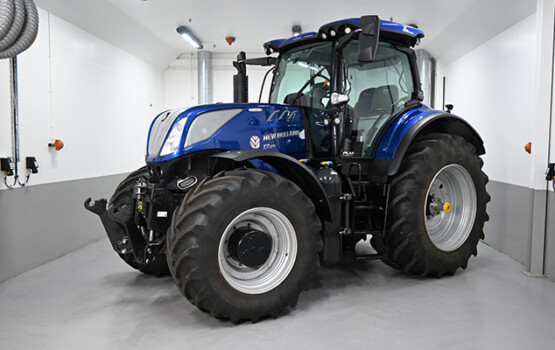Portal for more climate-friendly mobility
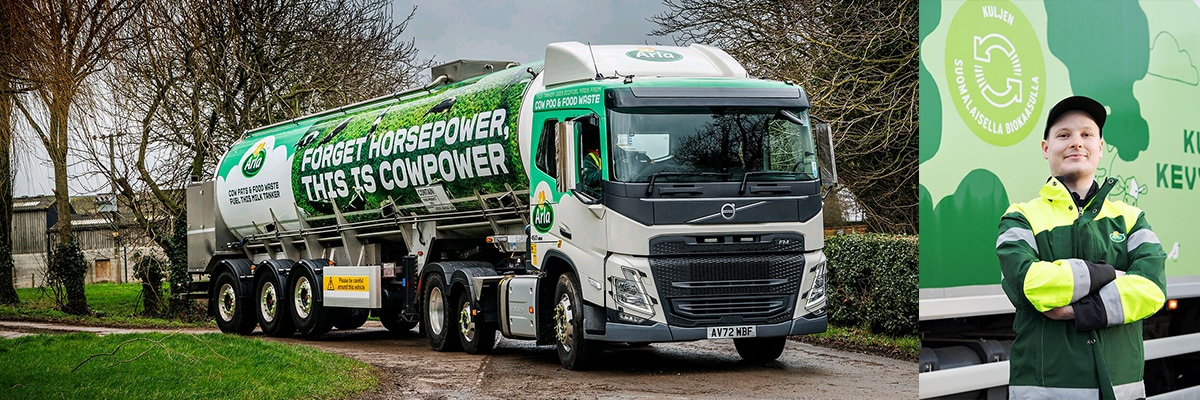
More biogas trucks for less CO2
With biogas trucks, green electricity and low-energy solutions, international dairy company Arla Foods seeks to optimise its ambitious climate targets.
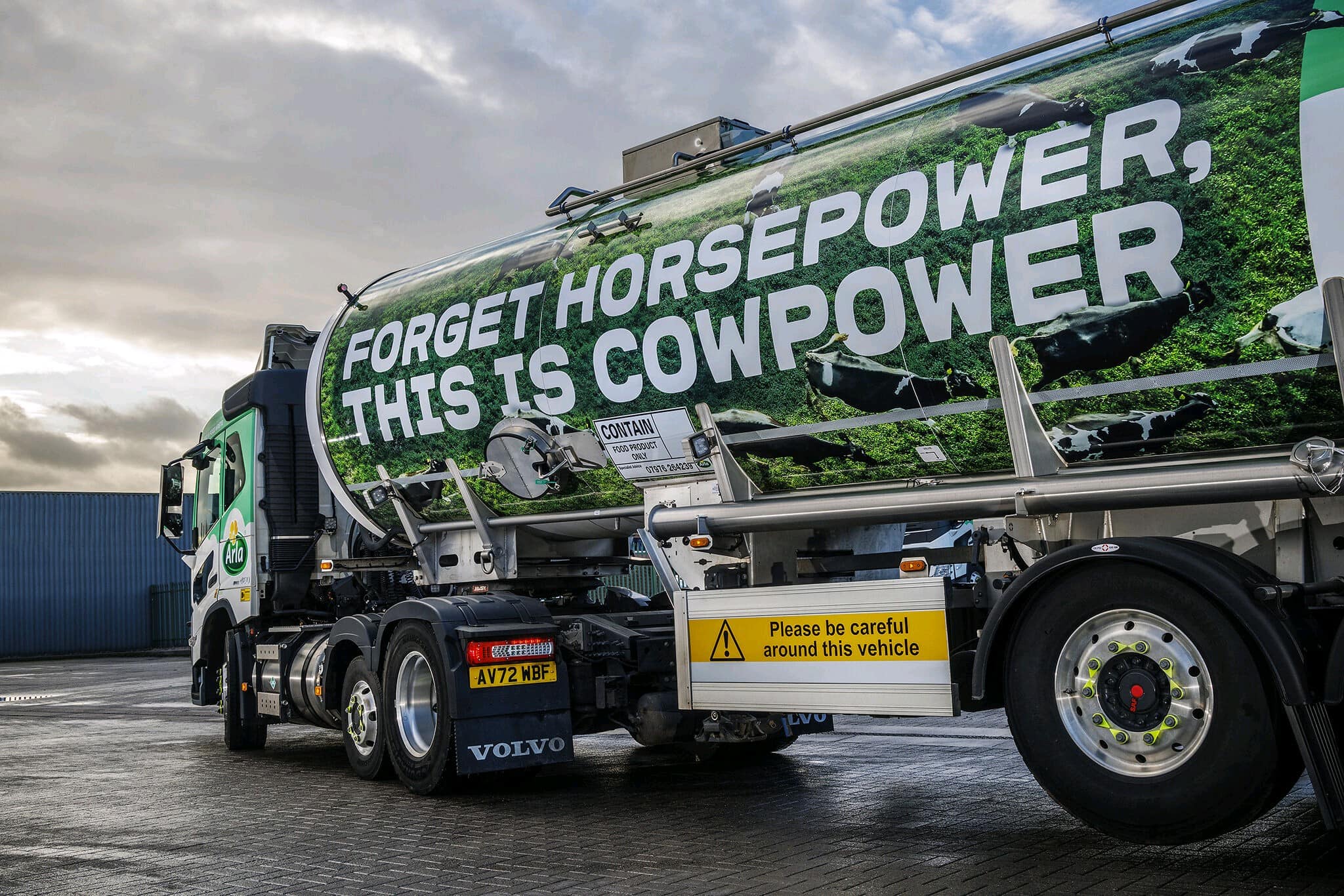 The international dairy group is causing a stir not only with cheeky slogans, but also with ambitious targets: Reducing CO2 emissions by 63 percent compared to 2015 as early as 2030! Source: Arla Foods
The international dairy group is causing a stir not only with cheeky slogans, but also with ambitious targets: Reducing CO2 emissions by 63 percent compared to 2015 as early as 2030! Source: Arla Foods
“Forget horsepower, this is cowpower” – this is the cheeky slogan used by Arla Foods milk tankers throughout the UK. The message is that thanks to biogas generated from cow manure and biogenic residues, the vehicles are fast but also climate-friendly. Owned by more than 8,400 farmers in Denmark, Sweden, the UK, Germany, Belgium, Luxembourg and the Netherlands, the international dairy company deliberately uses trucks that run on biogas or bio-LNG. This fits in perfectly with the strategy pursued by the world’s largest producer of organic milk products, which attaches great importance to sustainable agriculture.
Based on 2015 as its year of reference, Arla Foods is looking to achieve a 30% reduction in CO2 emissions by 2030. The dairy company was already very successful from 2015 to 2020, when it reduced operating emissions by 24%. “Our aim is to continue to pursue the emissions reduction path so as to limit global warming to 1.5 °C across our value chain as soon as possible,” said Hanne Søndergaard, Executive Vice President responsible for Agriculture and Sustainability at Arla Foods.
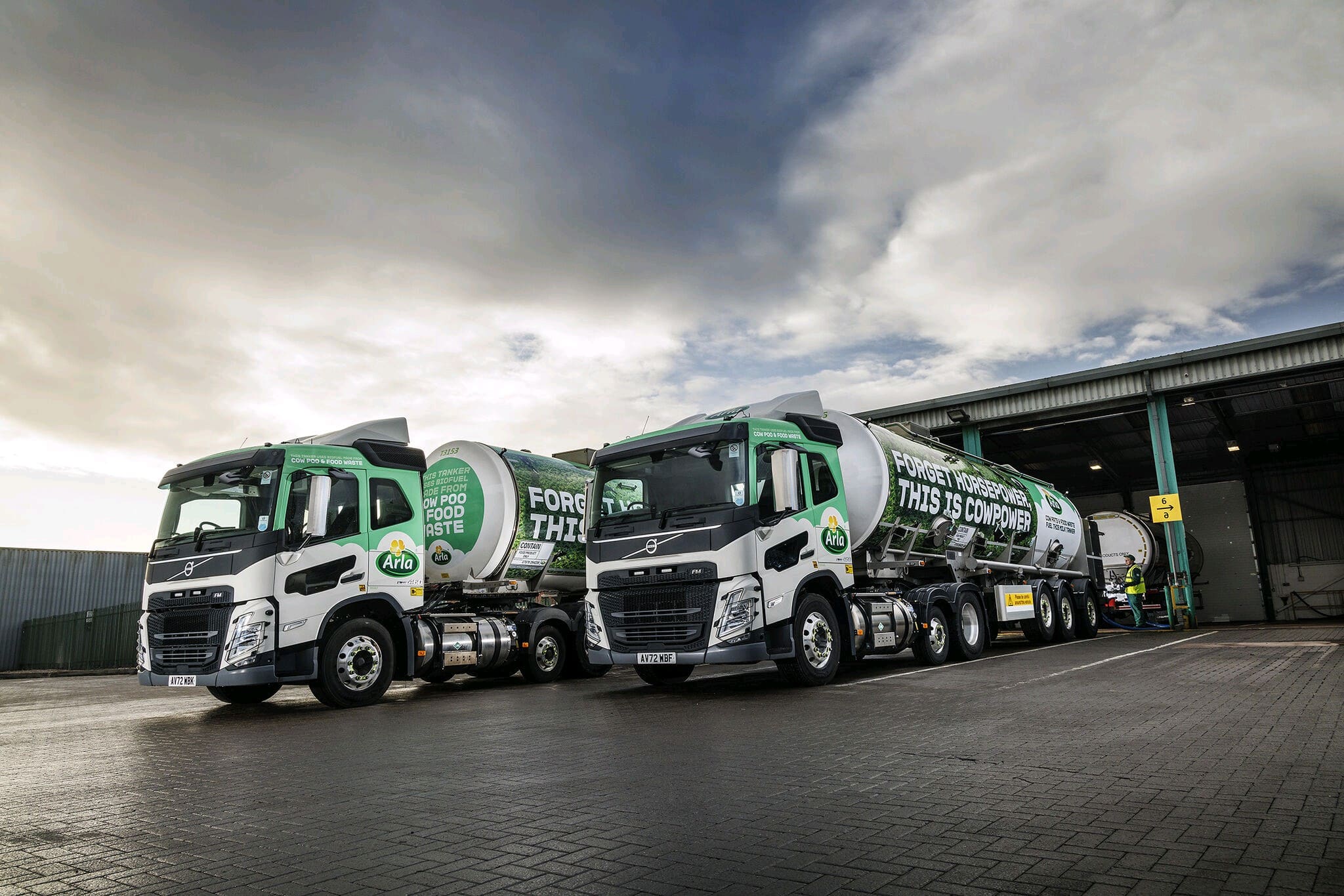 Arla Foods plans to switch to fossil-free fuels such as biogas and bio-LNG for its entire fleet of milk tankers and distribution vehicles. Source: Arla Foods
Arla Foods plans to switch to fossil-free fuels such as biogas and bio-LNG for its entire fleet of milk tankers and distribution vehicles. Source: Arla Foods
That’s why the company is now setting itself new, even more ambitious targets: the aim for 2030 now is to achieve a 63% reduction in greenhouse gas emissions generated through production, logistics and energy consumption. The next steps include the transition to fossil-free fuels such as biogas and bio-LNG for the entire fleet of milk tankers and distribution vehicles, and also convert the company’s production facilities and offices to renewable power and low-energy solutions. “Dairy products are popular all over the world and demand continues to grow, not least due to the fact that they’re rich in protein and calcium, as well as offering great versatility and affordability,” says Peder Tuborgh, CEO of Arla Foods. “Together with our farmers, we’re keen to drive forward the decarbonisation of the dairy industry so that people can continue to trust and enjoy dairy products.”
As a result, biogas vehicles have been used to deliver Arla products in Finland, too, since 2019. “The benefit of CNG-powered vehicles is that they generate fewer emissions – and biogas is cheaper than diesel,” explains Otto Ahola, head of the sales team at Arla. The Finns are planning to buy more biogas vehicles as soon as the leases for diesel vehicles expire, and they’re very satisfied with the first milk tanker that runs on CNG. “Milk collection has now been converted to the biogas age, too,” says Ahola. “Although delivery transportation is quite fuel-intensive, one tank of fuel is enough to cover more than 400 kilometres. Our vehicles do about 100 to 150 kilometres a day, so filling up once every two or three days is actually enough.”
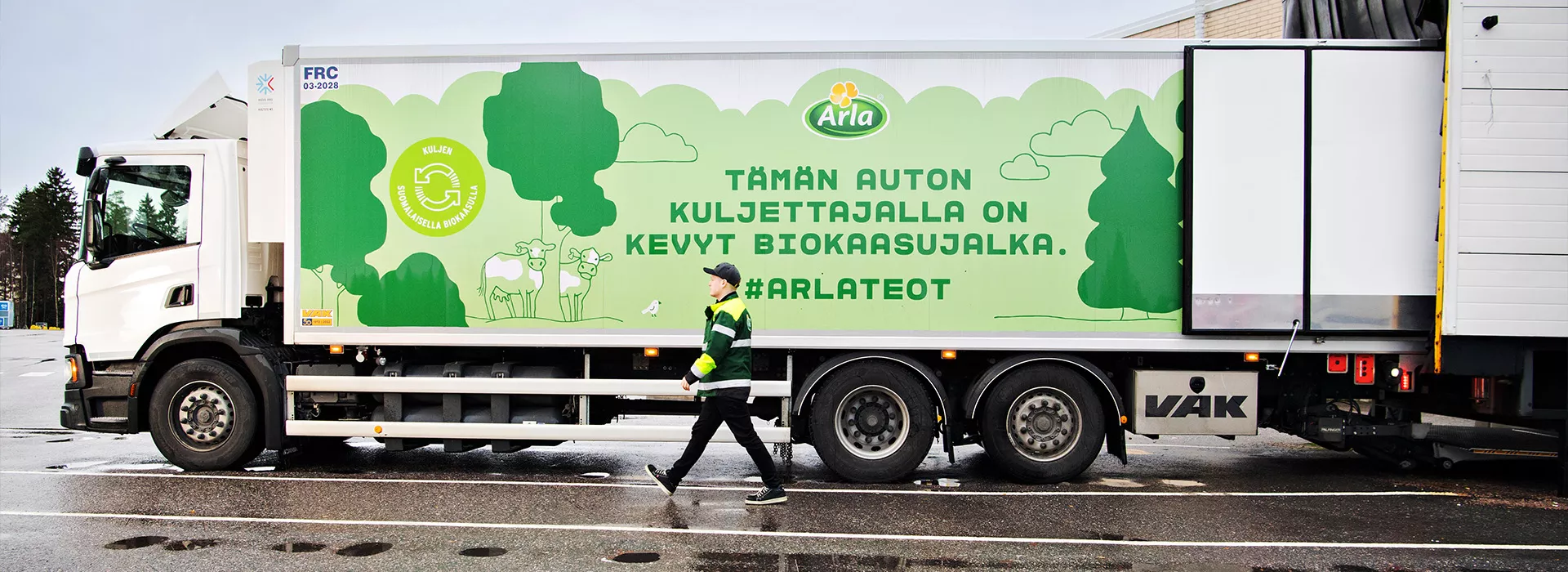 Otto Ahola, sales team leader at Arla in Finland, with one of the CNG-powered trucks with biogas from Gasum in the tank. Source: Arla Foods/Gasum
Otto Ahola, sales team leader at Arla in Finland, with one of the CNG-powered trucks with biogas from Gasum in the tank. Source: Arla Foods/Gasum
Last November, Arla started using its first milk collection tanker with LNG drive and bio-LNG in the tank to collect milk from farms in southern Finland. “The manufacturer’s promised average range is more than 1,000 kilometres,” explains Robert Sandström, Milk Acquisition and Logistics Manager at Arla. Since tankers often have to run idle at the dairy farms and pump the milk by means of ancillary units, however, the range is somewhat reduced. “The load makes a difference, too. When a tanker is fully loaded, consumption is higher. Time will tell as to how far a truck can travel with a full tank in practice. But 700 kilometres would be enough for us,” says Sandström.
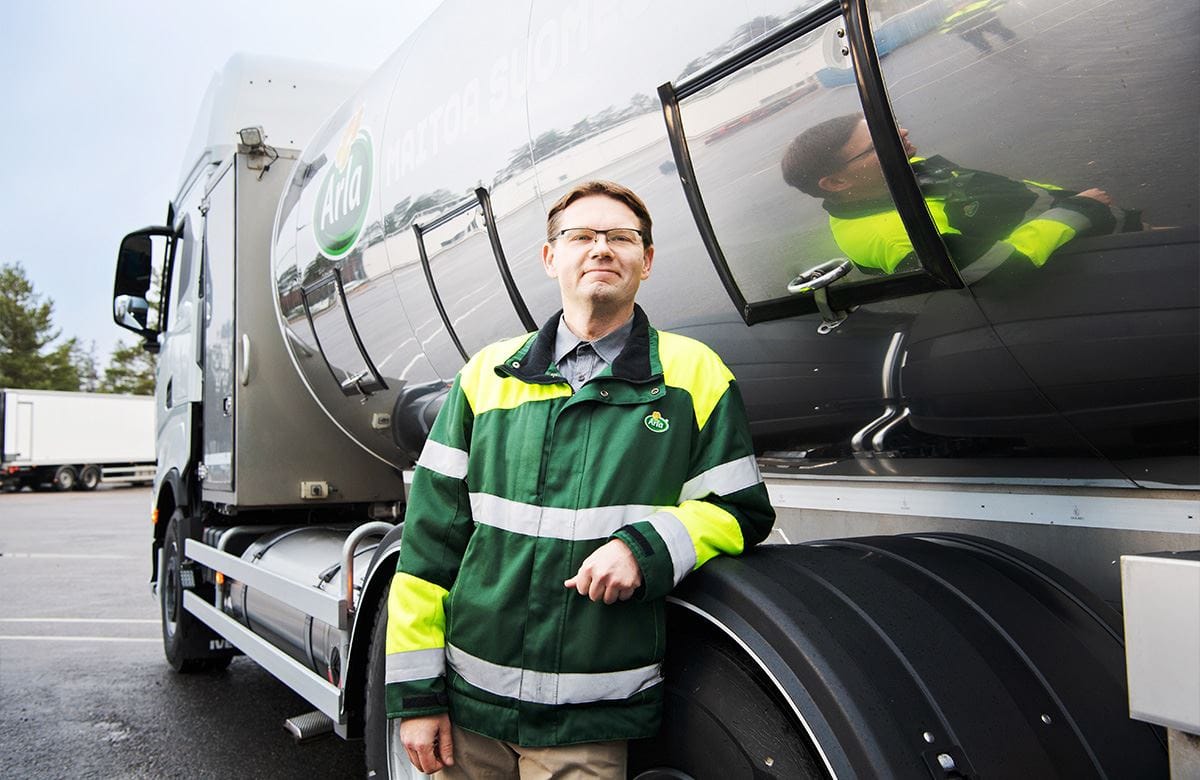 Robert Sandström, Milk Acquisition and Logistics Manager at Arla in Finland is looking forward to further experience with the LBG tanker. Source: Arla Foods/Gasum
Robert Sandström, Milk Acquisition and Logistics Manager at Arla in Finland is looking forward to further experience with the LBG tanker. Source: Arla Foods/Gasum
The logistics manager is looking forward to gaining further experience of the LNG tanker. “The use of biogas or bio-LNG is a competitive advantage for us – and it’s a simple solution in terms of achieving our ambitious emission targets,” adds Sandström. The Finns are not just focused on CO2 reductions, however, but also on the great potential of a functioning circular economy. “The farms generate a lot of biomass that could be used for biogas production. This could potentially even be a new source of income for the companies,” says Sandström. “So in the near future, it might actually be possible to use the biogas produced on our own farms to transport Arla’s milk and dairy products.” (jas, 14 March 2023)
You might also be interested in
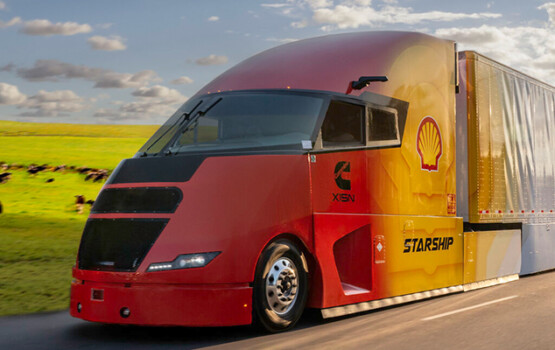
Shell Starship on record hunt
